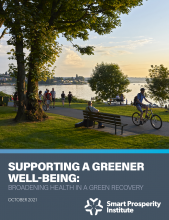The economic downturn in Canada since the start of the COVID-19 pandemic has been severe. While a green recovery offers an opportunity to advance solutions that support economic growth and improve environmental outcomes, policymakers should also consider the health impacts of green recovery spending.
Using a “health plus” approach, developed for this work based on a number of leading health evaluation frameworks from internationally recognized bodies, this report conducts a holistic assessment of the long-term health benefits of projects that are experienced by individuals and communities. Health plus places health and equity at the forefront and seeks to address synergistic goals between health, health equity and a green recovery by assessing the three factors outlined below:
- Personal Characteristics – Includes individual behaviours such as diet, exercise, alcohol or tobacco consumption, as well as psychosocial circumstances such as stress and coping styles.
- Socio-economic and Demographic Factors – Includes age, gender, race, level of education, and income level.
- Community Characteristics – Includes neighborhoods, access to healthcare and green spaces.
Using the health plus approach, this report delves into the five types of green recovery projects – workforce development, expanding active transport infrastructure, increasing food security, managing methane emissions from oil and gas, and municipal solid waste management - and describes their underlying potential to improve health and reduce health inequities in society. It also highlights the populations, communities, or regions that stand to gain most from the deployment of these projects.
READ THE FULL REPORT
Read more SPI research on the nexus of health, environment, and economy:
- A green and healthy recovery: How different green economic recovery investments compare for advancing human health in Canada
- The nature of health: integrating health considerations in urban nature-based solutions
- Supporting a Greener Well-Being: Broadening Health in a Green Recovery
- The Health Co-Benefits of a Clean Growth Future
- The Benefits of Cleaner Air



